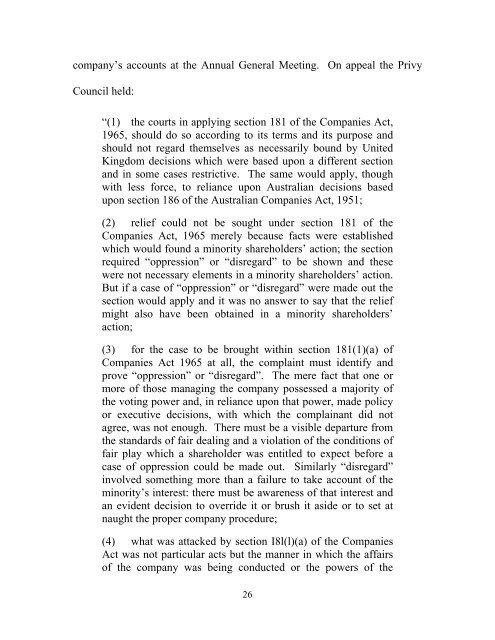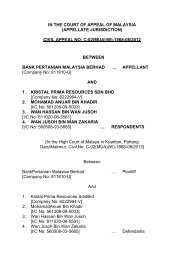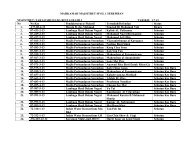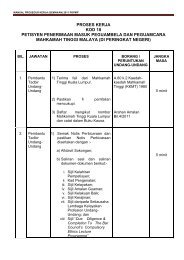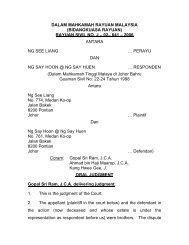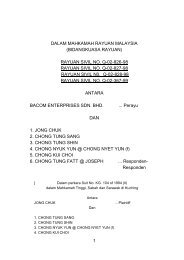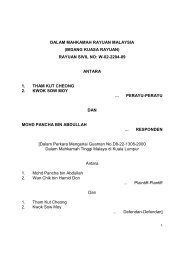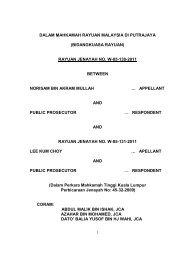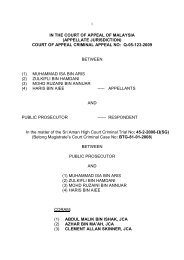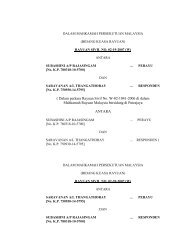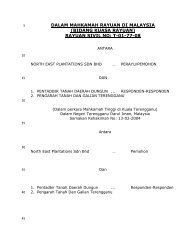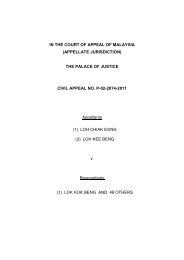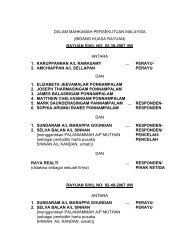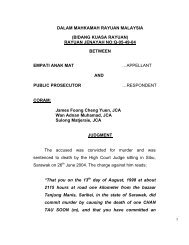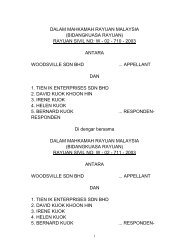in the court of appeal malaysia (appellate jurisdiction)
in the court of appeal malaysia (appellate jurisdiction)
in the court of appeal malaysia (appellate jurisdiction)
Create successful ePaper yourself
Turn your PDF publications into a flip-book with our unique Google optimized e-Paper software.
company’s accounts at <strong>the</strong> Annual General Meet<strong>in</strong>g. On <strong>appeal</strong> <strong>the</strong> Privy<br />
Council held:<br />
“(1) <strong>the</strong> <strong>court</strong>s <strong>in</strong> apply<strong>in</strong>g section 181 <strong>of</strong> <strong>the</strong> Companies Act,<br />
1965, should do so accord<strong>in</strong>g to its terms and its purpose and<br />
should not regard <strong>the</strong>mselves as necessarily bound by United<br />
K<strong>in</strong>gdom decisions which were based upon a different section<br />
and <strong>in</strong> some cases restrictive. The same would apply, though<br />
with less force, to reliance upon Australian decisions based<br />
upon section 186 <strong>of</strong> <strong>the</strong> Australian Companies Act, 1951;<br />
(2) relief could not be sought under section 181 <strong>of</strong> <strong>the</strong><br />
Companies Act, 1965 merely because facts were established<br />
which would found a m<strong>in</strong>ority shareholders’ action; <strong>the</strong> section<br />
required “oppression” or “disregard” to be shown and <strong>the</strong>se<br />
were not necessary elements <strong>in</strong> a m<strong>in</strong>ority shareholders’ action.<br />
But if a case <strong>of</strong> “oppression” or “disregard” were made out <strong>the</strong><br />
section would apply and it was no answer to say that <strong>the</strong> relief<br />
might also have been obta<strong>in</strong>ed <strong>in</strong> a m<strong>in</strong>ority shareholders’<br />
action;<br />
(3) for <strong>the</strong> case to be brought with<strong>in</strong> section 181(1)(a) <strong>of</strong><br />
Companies Act 1965 at all, <strong>the</strong> compla<strong>in</strong>t must identify and<br />
prove “oppression” or “disregard”. The mere fact that one or<br />
more <strong>of</strong> those manag<strong>in</strong>g <strong>the</strong> company possessed a majority <strong>of</strong><br />
<strong>the</strong> vot<strong>in</strong>g power and, <strong>in</strong> reliance upon that power, made policy<br />
or executive decisions, with which <strong>the</strong> compla<strong>in</strong>ant did not<br />
agree, was not enough. There must be a visible departure from<br />
<strong>the</strong> standards <strong>of</strong> fair deal<strong>in</strong>g and a violation <strong>of</strong> <strong>the</strong> conditions <strong>of</strong><br />
fair play which a shareholder was entitled to expect before a<br />
case <strong>of</strong> oppression could be made out. Similarly “disregard”<br />
<strong>in</strong>volved someth<strong>in</strong>g more than a failure to take account <strong>of</strong> <strong>the</strong><br />
m<strong>in</strong>ority’s <strong>in</strong>terest: <strong>the</strong>re must be awareness <strong>of</strong> that <strong>in</strong>terest and<br />
an evident decision to override it or brush it aside or to set at<br />
naught <strong>the</strong> proper company procedure;<br />
(4) what was attacked by section I8l(l)(a) <strong>of</strong> <strong>the</strong> Companies<br />
Act was not particular acts but <strong>the</strong> manner <strong>in</strong> which <strong>the</strong> affairs<br />
<strong>of</strong> <strong>the</strong> company was be<strong>in</strong>g conducted or <strong>the</strong> powers <strong>of</strong> <strong>the</strong><br />
26


